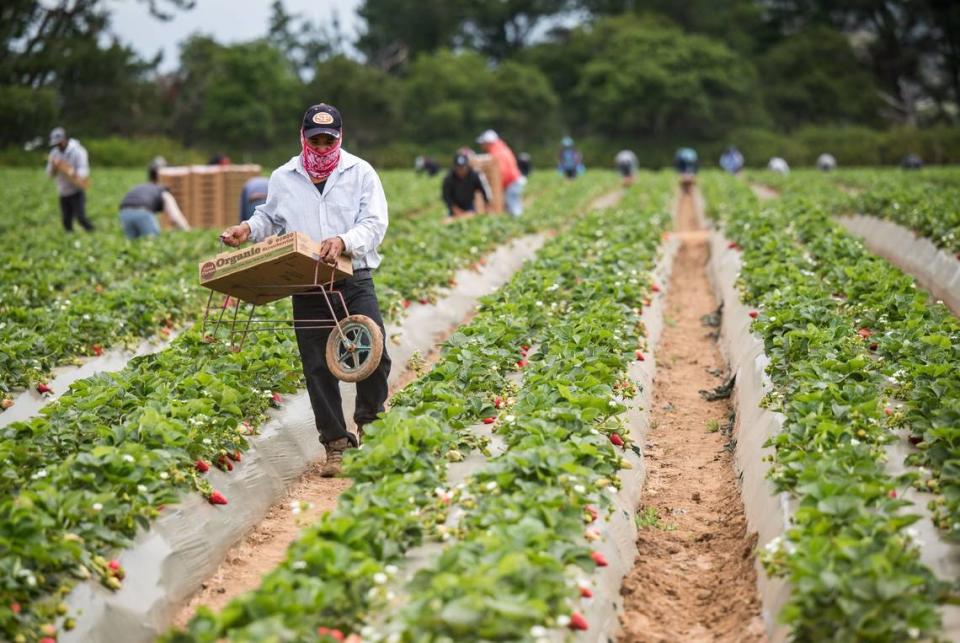Overtime law intended to help California farmworkers. New study says it led to less money
A California law requiring agricultural employers to pay overtime has led to some farmworkers making less money.
That’s according to a new UC Berkeley study, which is the first to explore the effects of the 2016 legislation. The law, Assembly Bill 1066, added agricultural workers in the state to federal overtime rules. They were previously excluded from the rules, which have existed since the passage of the Fair Labor Standards Act of 1938.
The state’s policy took effect in 2019 and mandated a gradual phase-in of overtime hours based on employer size.
Early research by Alexandra E. Hill, an assistant professor of Cooperative Extension at UC Berkeley, indicates that the law has resulted in a negative financial impact for workers.
Hill said many farmworkers are not working overtime and their take-home pay has decreased as a result of employers reducing hours. The study estimates about 10% of workers earning $100 to $200 less on their weekly paychecks.
Hill’s research aligns with what The Fresno Bee reported hearing from workers and employers earlier this year. Workers often express frustration about their hours being restricted and can sometimes mistakenly attribute it back to the law, not the employer.
Hill noted that employers are sometimes forced to cut hours as they don’t have much negotiating power over the larger retailers selling the products. She also conceded more research is needed on this topic, but it would seem the law is not helping the workers it sought to protect.
“It’s really important to think carefully about how we can best implement policies that really benefit the people that we’re trying to (help),” said Hill.
‘We told you so’
For agricultural business groups, the recent study is confirmation of what they had long feared. They protested the legislation, warning dire consequences for employers and workers.
“We told you so,” said Bryan Little, director of employment policy at the California Farm Bureau. “They didn’t take it seriously at the time and, now, I think the Legislature has a responsibility to deal with fallout of their decisions.”
Former Gov. Jerry Brown signed the law in 2016 after years of advocates pushing for overtime equality. At the time, it was deemed a “historic expansion of overtime rules.”

As of this year, the law requires employers who have 25 or fewer employees to pay overtime when someone works more than 50 hours a week, or nine hours per day. As of 2022, companies with more than 26 or more employees must pay overtime for farm laborers working more than eight hours a day or 40 hours a week. Full implementation will start for all farmworkers in 2025.
Little said employers are not against paying farmworkers more, given that the “whole cost equation makes sense.” He argued employers are making the decision to cut hours because it does not make economic sense.
“Agricultural producers don’t have the capacity to be able to simply increase their prices when their production costs go up,” Little said.
Who pays the cost of the food system?
Farmworker advocates, including the United Farm Workers, who backed the law argue that these early challenges are part of an adjustment process for the law and reflective of systemic issues in the industry.
“We have an option to keep fighting for an agricultural economy in which workers are treated with dignity and have a real say,” said Antonio De Loera-Brust, communications director for UFW.
De Loera-Brust conceded the union has heard from workers who have had their hours cut, but emphasized that employers are the ones making the schedules. He also acknowledged that retailers continue to raise prices, which creates a “horrible race to the bottom” that hurts growers and workers.
De Loera-Brust argues unionization is key to more fair wages, which will ensure that the people picking the groceries are able to afford them as well.
“Why is it the worker who has to pay the true cost of our food system,” De Loera-Brust said.

